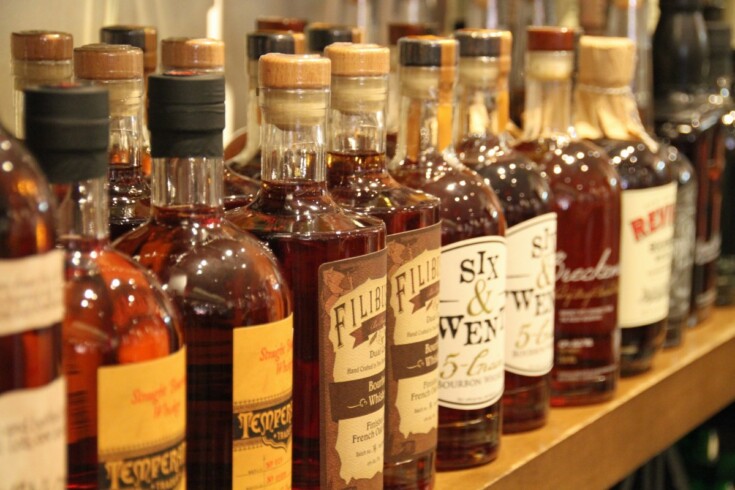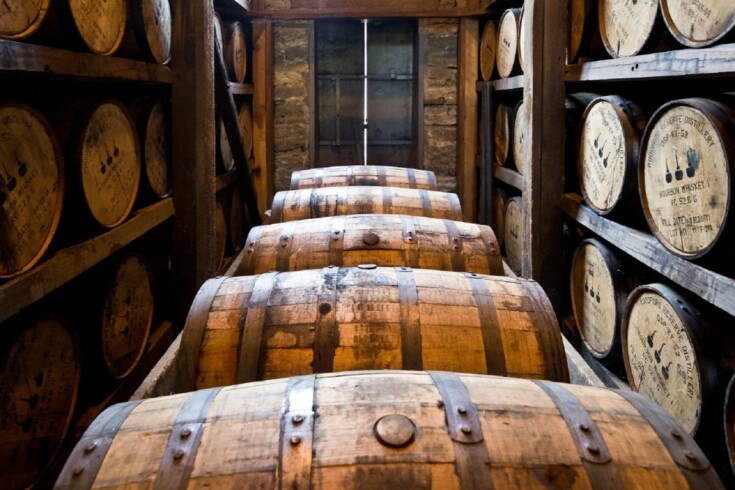
Fine whiskey is a drink that has been enjoyed for centuries. It is a beverage that has been aged for years to achieve a smooth and rich taste. However, with the advancement of technology, some companies claim that they can age fine whiskey overnight.
Several companies are currently using an aging process and technology that can make fine whiskey overnight. The key to aging whiskey quickly is to have the right conditions, such as a high concentration of oak wood, the right temperature and humidity levels, and a bit of patience. With these elements in place, it is possible to enjoy a mature whiskey in no time.
The idea of aging fine whiskey overnight may seem too good to be true for some, but it is a concept that has been explored by many distillers. While traditional aging methods are still preferred by many, the possibility of aging fine whiskey overnight has opened up new opportunities for the industry. In this article, we will take a closer look at the concept of aging fine whiskey overnight and explore all the factors that influence its flavor and aroma.
 photo credit: pxhere.com
photo credit: pxhere.com
Table of Contents
Understanding Whiskey Aging Process
Whiskey aging is a complex process that involves a combination of chemical reactions, evaporation, and absorption. It is an essential step in the production of high-quality whiskey, as it helps to develop the flavor, aroma, and color of the spirit.
The aging process of whiskey involves storing the distilled spirit in barrels made of oak wood for a period of time. The oak barrels are essential in the aging process, as they provide the whiskey with unique flavors and aromas. During the aging process, the whiskey absorbs various compounds from the oak, such as vanillin, tannins, and lignin. These compounds contribute to the flavor and aroma of the whiskey, giving it a distinct taste that is unique to each distillery.
The length of time that whiskey is aged can vary from a few months to several decades. The longer the whiskey is aged, the more complex and refined the flavor becomes. However, the aging process can also have a negative impact on the whiskey if it is over-aged. Over-aging can cause the whiskey to lose its flavor and become too woody, resulting in a less desirable taste.
The aging process of whiskey is affected by various factors such as temperature, humidity, and the type of oak used in the barrels. The temperature and humidity of the storage environment can affect the rate at which the whiskey ages. Higher temperatures and lower humidity can cause the whiskey to evaporate faster, resulting in a more concentrated flavor. On the other hand, lower temperatures and higher humidity can slow down the aging process, resulting in a less concentrated flavor.
Can Whiskey Age Overnight?
Whiskey is an alcoholic beverage that is typically aged for several years in oak barrels before it is bottled and sold. During the aging process, the whiskey interacts with the wood of the barrel, which imparts various flavors and aromas to the spirit. As a result, the longer the whiskey is aged, the more complex and nuanced its flavor profile becomes.
However, some people may wonder if it is possible for whiskey to age overnight. The answer is yes, it is possible to age whiskey quickly and get a mature flavor in a much shorter time frame. This is achieved by using a high concentration of oak wood, the right temperature and humidity levels, and a bit of patience.
Some companies are currently using an aging process and technology that can make fine whiskey overnight. After days of distilling, a whiskey is ready to be aged. The whiskey is then placed in a barrel that contains a high concentration of oak wood. The barrel is then stored in a temperature and humidity-controlled environment. The whiskey is left to age for a few hours to a few days, depending on the desired flavor profile.
It is important to note that while it is possible to age whiskey overnight, it is not the same as aging whiskey for several years. The flavors and aromas that are developed during long-term aging cannot be replicated in a short amount of time. Nonetheless, the process of aging whiskey overnight can produce a mature and complex flavor profile that is enjoyable to drink.
Factors Influencing Whiskey Aging
Whiskey aging is a complex process that involves several factors. Here are some of the key factors that influence whiskey aging:
Barrel Type
The type of barrel used for aging plays a crucial role in whiskey aging. Most whiskeys are aged in oak barrels, as oak has unique properties that help to enhance the flavor and aroma of the whiskey. American oak and European oak are the most commonly used types of oak barrels for whiskey aging. American oak tends to impart flavors of vanilla, caramel, and coconut, while European oak tends to impart flavors of spice, nuttiness, and dried fruit.
Barrel Size
The size of the barrel used for aging can also influence whiskey aging. Smaller barrels tend to age whiskey faster than larger barrels, as the whiskey has more contact with the wood. However, smaller barrels can also result in over-aging, which can lead to undesirable flavors and aromas.
Climate
The climate in which the whiskey is aged can also affect whiskey aging. Warmer climates tend to accelerate the aging process, while cooler climates tend to slow it down. This is because higher temperatures cause the whiskey to expand and contract, which allows it to extract more flavor from the wood. Cooler temperatures, on the other hand, cause the whiskey to contract and expand less, which slows down the aging process.
Time
The length of time that whiskey is aged is also an important factor in whiskey aging. Most whiskeys are aged for several years, as this allows the whiskey to develop complex flavors and aromas. However, some whiskeys can be aged for shorter periods of time and still be considered high-quality.
Distillation Process
The distillation process used to create the whiskey can also affect whiskey aging. Whiskeys that are distilled at higher proof tend to age more slowly, as they have less water content. Conversely, whiskeys that are distilled at lower proof tend to age more quickly, as they have more water content.
Time and Whiskey Aging
Whiskey aging is a process that requires time, patience, and specific conditions. The longer the whiskey is aged, the more complex and flavorful it becomes. However, can fine whiskey age overnight?
Role of Time in Whiskey Aging
Time is a critical factor in whiskey aging. During the aging process, the whiskey interacts with the wood of the barrel, which imparts flavors and aromas to the spirit. The longer the whiskey is aged, the more time it has to extract these flavors from the barrel.
According to Smithsonian Magazine, bourbon whiskey is typically aged for 6 to 10 years, while scotch whiskey is aged for about 20 years. However, some whiskeys can be aged for much longer, up to 30 years or more.
During the aging process, the whiskey also undergoes a chemical reaction known as esterification. This process involves the formation of esters, which are responsible for the fruity and floral notes in the whiskey. The longer the whiskey is aged, the more time it has to undergo esterification, resulting in a more complex and flavorful spirit.
While it is possible for some companies to use technology to speed up the aging process, it is not recommended as the process of aging whiskey takes time and requires specific conditions. The best way to achieve a fine whiskey is to allow it to age naturally over time.
Misconceptions About Whiskey Aging
There are several misconceptions about whiskey aging that have been perpetuated over time. Here are a few of them:
1. The older the whiskey, the better it is
While it is true that some older whiskeys can be quite exceptional, age does not necessarily equate to quality. In fact, a whiskey that has been aged for too long can lose some of its flavor and character. The quality of a whiskey depends on several factors, including the quality of the ingredients, the distillation process, and the aging conditions.
2. Whiskey must be aged for a specific amount of time
There is no set amount of time that a whiskey must be aged for it to be considered “good.” The aging process depends on several factors, including the type of whiskey, the type of barrel it is aged in, and the aging conditions. Some whiskeys can be aged for just a few months and still be considered high-quality, while others may need several years to reach their peak flavor.
3. Whiskey cannot be aged quickly
While traditional whiskey aging can take several years, it is possible to age whiskey quickly using modern technology and techniques. Some companies are using high-tech aging processes that can produce mature, high-quality whiskey in a matter of days or weeks. However, it is important to note that not all quick-aged whiskeys are created equal, and some may not have the same depth and complexity as traditionally-aged whiskeys.
4. Whiskey must be aged in oak barrels
While oak barrels are the most common type of barrel used for aging whiskey, they are not the only option. Whiskey can be aged in a variety of barrels, including those made from cherry, maple, and other types of wood. Each type of barrel imparts its own unique flavors and characteristics to the whiskey, so the choice of barrel is an important factor in the aging process.
Frequently Asked Questions
How long does it take for whiskey to age properly?
The aging process of whiskey can take anywhere from a few months to several years. However, the exact time required for a whiskey to age properly depends on several factors such as the type of grain used, the barrel used for aging, and the climate of the aging environment, among others.
What factors affect the aging process of whiskey?
Several factors can affect the aging process of whiskey, including the type of grain used, the barrel used for aging, the temperature and humidity of the aging environment, and the length of time the whiskey is aged. Additionally, the quality of the water used during the distilling process can also impact the aging process.
Can aging whiskey too long ruin its flavor?
Yes, aging whiskey for too long can ruin its flavor. Over-aging can cause the whiskey to become too woody and bitter, resulting in a less enjoyable drinking experience. However, the ideal aging time for whiskey varies depending on the type of whiskey and the preferences of the distiller.
At what point does whiskey stop aging?
Whiskey stops aging once it is bottled. Unlike wine, whiskey does not continue to age once it is removed from the barrel and placed in a bottle. Therefore, the age of a whiskey is determined by the length of time it spent in the barrel before being bottled.
What is the difference between aged and unaged whiskey?
Aged whiskey has spent a certain amount of time in a barrel, which imparts flavor and color to the whiskey. Unaged whiskey, on the other hand, has not been aged and typically has a clear color and a sharper, more intense flavor.
Does the type of barrel used for aging affect the flavor of the whiskey?
Yes, the type of barrel used for aging can significantly affect the flavor of the whiskey. Different types of wood, such as oak, cherry, and maple, can impart different flavors and aromas to the whiskey. Additionally, barrels that have previously held other types of alcohol, such as sherry or bourbon, can also influence the flavor of the whiskey.
Conclusion
In conclusion, it is possible for a fine whiskey to age overnight. However, the process is not as simple as leaving the whiskey out on the counter. With the right conditions, such as a high concentration of oak wood, the right temperature and humidity levels, and a bit of patience, a mature flavor can be achieved in a much shorter time frame.
Some companies are currently using an aging process and technology that can make fine whiskey overnight. However, it is important to note that every distiller has its unique process and system for aging. Therefore, it is essential to understand the specific process used by the distiller before attempting to age whiskey overnight.
It is also important to note that an unopened bottle of whiskey can stay good indefinitely, as the only thing that could start altering it is the oxidation process. Therefore, it is recommended to store the bottle in a cool, dark place, away from direct sunlight and heat sources.
Overall, while it is possible for a fine whiskey to age overnight, it is crucial to understand the specific process used by the distiller and to create the right conditions for aging. With the right approach, a mature flavor can be achieved in a much shorter time frame, but it is important to exercise caution and not make exaggerated or false claims about the process.



